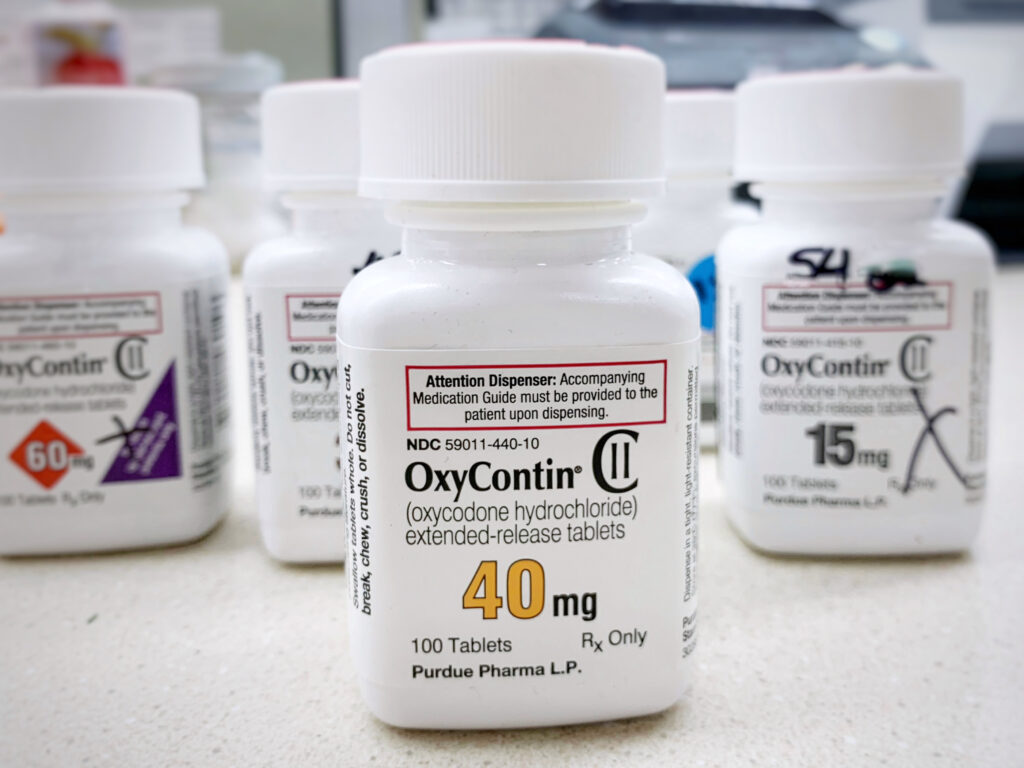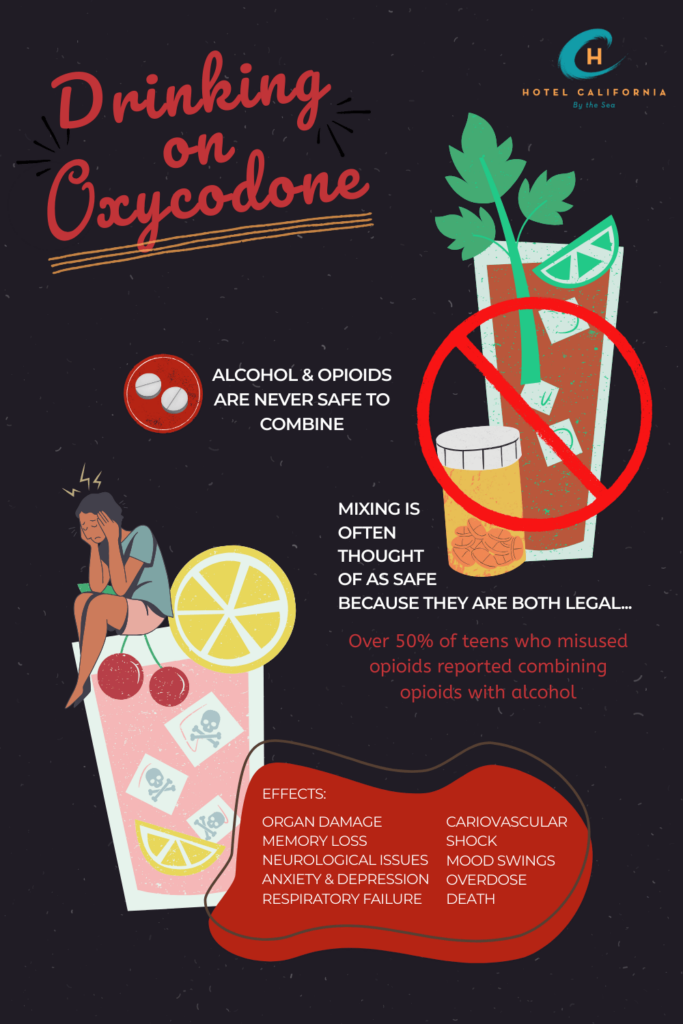Drinking on Oxycodone
Drinking on oxycodone can be dangerous and lead to life-threatening consequences. Alcohol abuse and opioid abuse are two of the most pressing public health issues in America. According to the National Institute on Drug Abuse (NIDA), an average of 140 people in the US die each day from overdosing on opioid drugs such as oxycodone. And an estimated 88,000 people die from alcohol related causes each year, according to the National Institute on Alcohol Abuse and Alcoholism (NIAA).

Alcohol and opioids are never a safe combination. Despite the dangers and risks, polysubstance use of both drugs is becoming more common and more popular. In a 2017 study of both medicines, research found that about 15% of people who died of opioid related causes were also drinking alcohol. Other findings revealed that over 25% of adults diagnosed with opioid use disorder also had an alcohol use disorder.
Alcohol Use Disorder
Alcohol is a legal substance that has been used for hundreds of years. Alcohol works by depressing the central nervous system and producing temporary calming effects, slowing down reflexes and causing poor coordination. Alcohol alters your mood, behavior and neuropsychological functioning. It can depress the central nervous system until respiratory failure, coma or death. Too much alcohol can lead to abuse and addiction.
Alcohol use disorder is a behavioral health disease characterized by dangerous patterns of drinking despite the negative consequences. Alcohol has the ability to chemically alter your brain and impair functioning both physically and psychologically. It is often a substance used alongside other mood-altering drugs such as opioids.
The rise in Opioid Use Disorder
Studies show an estimated 2 million Americans struggle with opioid abuse. Some of the biggest contributing factors to the opioid crisis are due to its ease of availability and over-prescribing by medical providers. In 2013, a reported 58.8 million prescriptions for oxycodone were written. Thousands of Americans die each year from overdosing on prescription opioids or developing an opioid addiction.

What is Oxycodone?
Oxycodone is a popular prescription opioid. It often goes by the brand name OxyContin. It is a Schedule II controlled substance and a powerful painkiller with a high risk for abuse and addiction. Oxycodone is a slow-acting medication that releases into the bloodstream over time to help treat different types of moderate to severe pain. It is illegal to possess oxycodone without a prescription.
How does an opioid like oxycodone work? It works by changing the way the brain perceives pain. Oxycodone is a chemical that binds to the opioid receptors in your brain and blocks the transmission of pain signals in the nervous system.
When doing this, it goes to depress other aspects of the body. It can suppress the respiratory system to a point at which it becomes respiratory failure.
The drug also acts on the pleasure center of the brain. It can produce feelings of sedation and euphoria by releasing a surge of dopamine, one of the brain’s feel-good chemicals. It can be so powerful that some users can develop an addiction after only using the drug once.
Illicitly manufactured oxycodone often goes by names such as oxy, percs or 512s. Other types of opioids include morphine, codeine, hydrocodone, hydromorphone, fentanyl, tramadol, methadone and buprenorphine. Common side effects of oxycodone include slowed breathing, nausea, decreased heart rate, euphoria, constipation, dizziness, vision problems and potential for fluid in the spine and brain.
How long are the effects of Oxycodone?
Oxycodone can take effect about 15-60 minutes after the initial dose. Some people can experience pain relief for about 4-6 hours and sometimes pain relief can last up to 12 hours. Prescription opioids like oxycodone are highly addictive because of their long-lasting effects compared to other synthetic opioids such as heroin.
In some cases, the drug can stay in your system for 24 hours or as long as 3 days, depending on the dosage you’ve taken and how often you’ve been taking the medication. Immediate release formulas work within 20-30 minutes, reaching peak concentration around the 1-2 hour mark. Extended-release formulas can take up to 4-5 hours to reach peak concentration.
Check Your Insurance Coverage for FREE
Find out if your insurance covers addiction treatment in minutes. We accept most insurance!
Drinking on Oxycodone
According to the CDC, alcohol was involved in about 22% of deaths in 2010. And about 18% of emergency room visits involved an issue with prescription opioids. A study from the NIDA found that over 50% of teens who misused opioids reported combining opioids with alcohol. In 2016, the FDA gave all opioid medications a black box warning label to advise users against the serious side effects when combined with other substances that impact the central nervous system.
People often mix alcohol and oxycodone in an attempt to intensify the euphoric effects of both drugs. Because both of these substances are legal, many people are unaware of the dangerous consequences of the polysubstance use of alcohol and oxycodone. In fact, one of the most common ways to misuse oxycodone is to use it with alcohol. People who binge drink are also twice as likely to misuse prescription opioids while drinking.
Both drugs are central nervous system depressants and can severely slow down the functioning of the brain and other organs in the body. In extreme cases, it can slow down your breathing so much so that it causes brain damage. It is a form of suffocation. Research has found that even drinking in moderation while on prescription opioids like oxycodone is a high enough risk for developing respiratory depression.
Effects of drinking Alcohol while taking Oxycodone
- Shock to the cardiovascular system – abnormal heart rate, heart attack or stroke
- Respiratory failure – the lack of oxygen to the brain and other organs can lead to paralysis, nerve damage or buildup of fluid in the lungs
- Drowsiness
- Slurred speech
- Impaired judgment
- Slowed reflexes
- Liver damage
- Gastrointestinal issues
- Kidney damage
- Neurological issues
- Increased risk of cancer
- Memory loss
- Mood swings
- Seizures and Delirium Tremens
- Anxiety and depression
- Confusion
- Overdose and death
Reach out to Hotel California by the Sea
We specialize in treating addiction and other co-occurring disorders, such as PTSD. Our Admissions specialists are available to walk you through the best options for treating your addiction.
Treatment for Polysubstance Abuse
Alcohol and oxycodone are both central nervous system depressants that can cause dangerous side effects if used together. When used together, it can increase the risk of alcohol related accidents. It is not safe because it can significantly enhance drowsiness and slow breathing to the point where a person can stop breathing completely. Alcohol alters brain chemistry and can lead to tolerance, dependence and addiction. Oxycodone is a powerful opioid that can easily lead to addiction even after one dose of the medication.
Professional behavioral health treatment programs such as Hotel California by The Sea provide substance use disorder treatment, alcohol use disorder treatment and polysubstance use disorder treatment.
We offer treatment at all levels of care, including detox, residential, PHP and IOP. We utilize evidence-based treatment methods that include CBT, DBT and EMDR therapy. Hotel California by the Sea is dedicated to helping clients achieve their goals in sobriety and overcome their addiction.
References:
https://www.addictioncenter.com/alcohol/alcohol-oxycodone
https://www.alcoholhelp.com/alcohol/drinking-drugs/alcohol-oxycodone
https://www.goodrx.com/well-being/substance-use/opiates-and-alcohol
https://zinniahealth.com/substance-use/oxycodone/with-alcohol
https://www.verywellhealth.com/oxycodone-and-alcohol-5088468
https://www.healthline.com/health/addiction/oxycodone-and-alcohol
